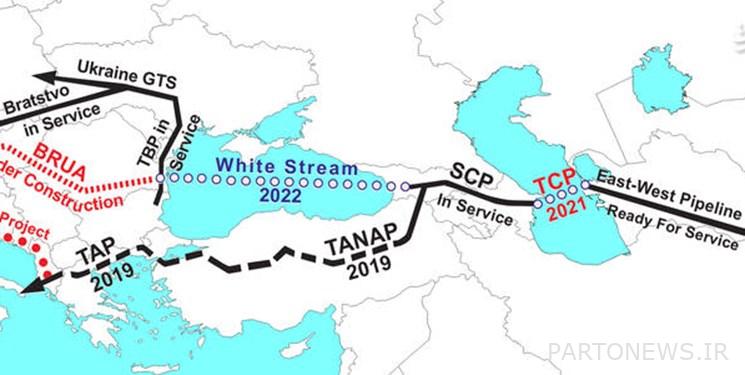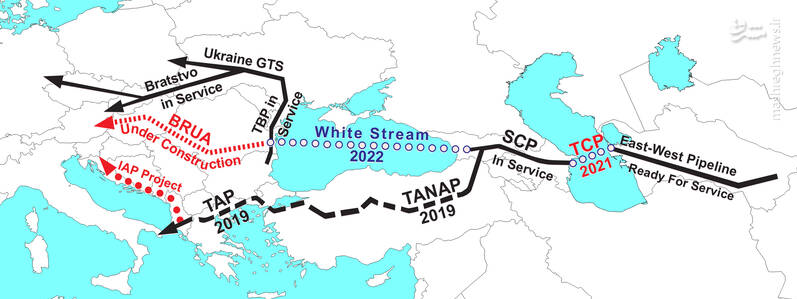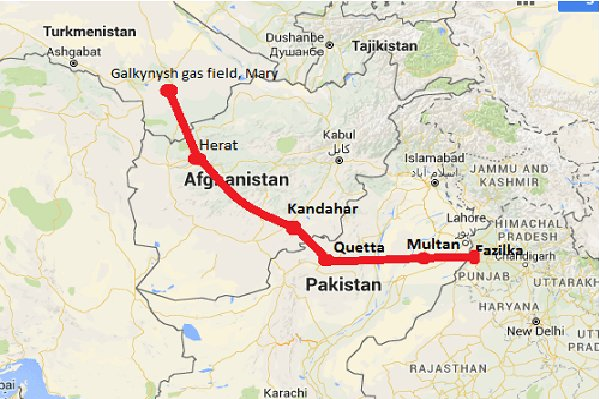Changing regional gas market equations with tripartite swap / Iran step to remove Transcaucasian and TAPI pipeline

According to Fars News Agency’s economic correspondent, the gas swap agreement between Turkmenistan, Iran and Azerbaijan was reached on Sunday on the sidelines of the 15th meeting of the Economic Cooperation Organization (ECO). According to the agreement, 1.5 to 2 billion cubic meters of gas will be imported to Iran annually from Turkmenistan (Sarakhs) and will be sent to Azerbaijan (Astara) through the Iran Transmission Line Network.
Minister of Oil Javad Oji on the details of the gas swap agreement between Turkmenistan, Iran and Azerbaijan explains“According to this tripartite agreement, Iran annually delivers about 1.5 to 2 billion cubic meters of gas from Turkmenistan to Azerbaijan. Iran’s gas relations with Turkmenistan had been suspended since December 2016, but with the conclusion of this agreement, a step forward was taken in the energy relations between the two countries. “This contract will help provide winter fuel to the provinces of Khorasan Razavi, North and South, Golestan and Semnan.”
However, this gas contract has economic benefits for Iran and can help supply gas to 5 northeastern provinces of Iran and also lead to the stability of Iran’s gas network in remote areas of the gas fields in Assaluyeh. But what has not been covered in the media so far is an important political message that lies at the heart of this agreement and can fulfill Iran’s plan to become a gas hub in the region.
* Master plan of the Ministry of Petroleum for Kish and Mat Trans-Caspian and Tapi pipelines
In fact, concluding a tripartite gas swap agreement carries an important political message of reviving relations between Iran and Turkmenistan after five years. This message is important because it could facilitate Iran’s next steps in expanding trade with Turkmenistan, especially in the gas field.
In the last 8 years, due to the wrong approach of the Ministry of Oil, Iran is on the verge of being removed from the regional gas market. Due to Iran’s passive approach, serious competitors have been formed to bypass and permanently remove Iran from the regional market, including the construction of the TAPI pipeline and the Trans-Caspian pipeline (TCP).
According to experts, concluding a gas swap agreement with Turkmenistan is the first step in implementing a master plan in the Ministry of Oil of the 13th government, the continuation of which will lead to the matting of these two rival pipelines of Iran’s regional gas market.
* Trans-Caspian Pipeline, Missing South Gas Corridor to connect Turkmenistan to Europe
Figure 1 shows the Trans-Caspian Pipeline (TCP). According to the pipeline, Turkmenistan’s gas network connects the Caspian Sea to Azerbaijan and is designed to transfer Central Asia’s vast gas resources to European energy markets through the Southern Gas Corridor.
In general, in the Southern Gas Corridor, the Trans-Caspian Pipeline (TCP) between Turkmenistan and Azerbaijan will be connected from the Caspian Sea to the SCP pipeline inside Azerbaijan.
The end of the SCP pipeline is then connected to the TANAP pipeline in Turkey. The end of the TANAP pipeline will also be connected to Europe via the Trans Adriatic Pipeline (TAP) to Greece, including Greece, Albania and Italy.

Figure 1
Currently, the only missing link in the Southern Gas Corridor is the Trans-Caspian Pipeline (TCP), which has been stalled for years due to legal disputes in the Caspian Sea over heavy investment and economic justification. As a result, Turkmenistan, the fourth largest holder of gas resources in the world, has not yet connected to the European continent.
* Map of Iran to exclude the Trans Caspian project
In Figure 1, it is clear that if the TCP pipeline project is completed, Turkmen gas will be connected to Europe by bypassing Iran. The attempt to complete the project was made while the government of Tadbir and Omid did not show any ideas, countermeasures or alternatives to prevent its construction in the region’s gas market.
According to the explanations given about the Trans-Caspian pipeline, it is now possible to analyze the importance of the Iranian gas swap agreement between Azerbaijan and Turkmenistan in a larger space. In fact, this gas swap agreement is Iran’s first step to revive gas relations with the two influential countries in the Southern Gas Corridor, and further strengthening of these relations could permanently suspend the implementation of the Trans-Caspian project.
Iran’s gas pipeline network is one of the most complex gas networks in the world, which has the ability to transfer gas from Turkmenistan to Azerbaijan and play a special role in the predefined “Southern Gas Corridor”. Even if there is a large volume of gas transmission between Turkmenistan and Azerbaijan, it is possible that with the development of the gas network, Iran will be able to participate in this big game.
As a result, the gas swap agreement between Iran, Turkmenistan and Azerbaijan should be analyzed in the framework of a grand plan in the Ministry of Oil to remove the Trans-Caspian pipeline and participate in the Southern Gas Corridor game, and thus the conclusion of this agreement, although small The economic dimension is strategically and politically a great victory for the thirteenth government.
* Plan to remove Iran from the eastern market of the region by constructing the TAPI pipeline
Figure 2 shows the TAPI gas pipeline. The pipeline will transport Turkmen gas to Afghanistan, Pakistan and India, respectively. The idea of the TAPI pipeline was put forward to counter Iran’s peace pipeline for gas exports to Pakistan and India, a pipeline that was on the verge of completion and Iranian gas exports to Pakistan at the end of the tenth government. The project was stopped.

Figure 2
In fact, thanks to the passive energy diplomacy of the 11th and 12th governments, and while Iran could import gas from Turkmenistan and export it to Afghanistan, Pakistan and India, the pipeline was built with American support to remove Iran from the regional gas market. .
The Taliban’s overthrow of the former Afghan government and the huge amount of investment were among the reasons why the construction of the TAPI pipeline did not progress significantly despite US efforts.
* Revive relations with Turkmenistan to change the equations of the regional gas market
As noted, Turkmenistan, as the fourth largest holder of gas resources in the world, has played a significant role in two key gas transit projects in the region. Projects that were designed in the shadow of the darkening of Iran-Turkmenistan relations and with the aim of bypassing Iran, and were strengthened in the government of prudence and hope.
Now, with the coming to power of the 13th government, diplomatic relations between Iran and Turkmenistan have been revived, which is evidenced by the conclusion of a gas swap agreement after a five-year suspension in gas interactions between the two countries. Thus, reviving Iran’s relations with Turkmenistan could permanently eliminate both the Trans-Caspian and Tapi pipelines.
The use of Iran’s natural gas network for Turkmenistan also has many advantages, the most obvious of which is the lack of investment required for the construction of new pipelines at exorbitant costs. By strengthening relations between the two countries and building mutual trust, Iran could pull Turkmenistan, two serious and threatening regional gas market rivals, out of the equation by leaning Turkmenistan toward it.
As a result, if we look at the issue of the gas swap agreement between Iran and Turkmenistan from this perspective, we will find that the issue of this agreement is not just the transfer of several million cubic meters and this agreement should be used as a step forward to change the equations of the regional gas market. He looked at Iran’s interests.
End of message /
.

